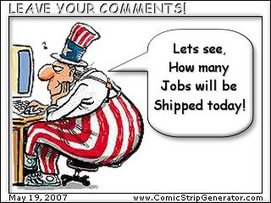What Is A Derivative
No one is asking the right questions.
Since the government has now committed to purchase $700,000,000,000 (I think I’ve gotten all the zeros right) in the toxic paper that the banks, domestic and foreign, are holding as assets on their books, I felt it was time to give my vast audience my view of what the government will be purchasing with our tax dollars.Dictionary.com explains simply:
a financial contract whose value derives from the value of underlying stocks, bonds, currencies, commodities, etc. Riskglossary.com defines derivative as: A derivative instrument (or simply derivative) is a financial instrument which derives its value from the value of some other financial instrument or variable.
OK, that tells us that a derivative is a contract-on-a-contract. But what is in these contracts that the average American will now own. Why have the banks cut the value in financial instruments to the point that causes them to go out of business?
Money was raised for home and commercial mortgages by issuing bonds. The banks that originated the mortgage would sell it to someone like Fannie, Freddie or one of the other commercial banks. They would bundle the mortgages and send them to the rating agencies. The rating agencies would rate the best of the bunch as AAA and the rest could be divided up into 15 lower ratings. Since many pension funds, insurance companies, financial institutions or investment groups require a AAA rating on the bonds they purchase, the lower rated bonds have to pay a premium interest rate to entice the sale of these bonds.
That’s where derivatives come in. Thanks to the Community Reinvestment Act of 1977 and its’ reworking in 1995, Congress allowed the banks to become more inventive with the way they sell and fund mortgages. The lower rated bonds are re-bundled with other contracts that could be anything from options and warrants (a contract allowing the purchase of stock at a future date at a specified price), or other types of debt obligations to other bonds themselves. This process snowed the rating agencies to re-rate 96% of the lower rated securities as AAA.
We don’t know what we’re buying. We don’t know what we’re paying for it. But we’re sure it is going to work and hey, we could even make something. This is from the people that voted multiple times against increased regulations to control Fannie and Freddie.
The point is that no one is asking the right questions. The banks and the rating agencies have records to show what is in each of these bundles, but I have not heard one banker or politician ask for that information. It’s time a little light is thrown on this stuff. How can we effectively regulate if we don’t know what we’re regulating. No more free passes.










